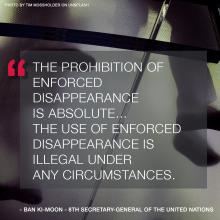Joint Statement on International Day for Victims of Disappearances
‘At the moment, we don’t know his whereabouts, which prison he is in, or even if he is alive.’
‘On December 26, 2017, my sister took a flight from Malaysia to our home town. We have not heard from her since.’
‘For more than 10 years, we have not been able to be together as a family… each time he disappears, our only hope is that he is able to live.’
 Beginning in 2011, the international community has dedicated 30 August as an opportunity to raise awareness of enforced disappearances. The stories above are just a few examples of hundreds or thousands of lives affected by this crime.
Beginning in 2011, the international community has dedicated 30 August as an opportunity to raise awareness of enforced disappearances. The stories above are just a few examples of hundreds or thousands of lives affected by this crime.
Today, we remember those gone, and those who are left behind. It is a day to press governments to step up efforts to prevent and investigate disappearances, and support families looking for their loved ones. It is a day to stand in solidarity with all victims of this crime, and call on authorities to hold those responsible to account.
Globally, however, enforced disappearances continue, affecting those most vulnerable, the marginalised or those targeted by state and non-state actors. Often, they can continue is because governments fail to ensure that their citizens are protected, or struggle to combat the crime. In China, however, enforced disappearance has become a tactic explicitly used by the Chinese Communist Party to stifle criticism and threaten dissent.
Download the Joint Letter as a PDF
.
Put simply, state policies are designed to permit disappearances and perpetuate impunity. This includes the persistent erosion of due process guarantees, such as blocking access by lawyers and family to those detained; extensive use of legalised forms of incommunicado detention, including ‘Residential Surveillance in a Designated Location’; a system of ‘retention in custody’ called liuzhi for Communist Party members and public sector workers; the transition of released prisoners into house arrest or other forms of ‘non-freedom’; and the widespread use of re-education camps in Xinjiang.
Today, we call on the Chinese government to stop all forms of enforced disappearance.
Numerous United Nations human rights experts have raised concerns about the practice of enforced disappearance, including the specific use against Tibetan and Uyghur populations, and against human rights defenders. The Working Group on Arbitrary Detention has noted that these practices could possibly constitute crimes against humanity. Standing with the victims of disappearance is not just about justice. It is about standing up for truth, human dignity, and love.
 In addition to urging China to change its practices, including by repealing legal provisions allowing for enforced disappearance in all its forms, we call on the United Nations and Secretary General Antonio Guterres to step up efforts to ensure access by independent human rights experts to all places of detention in China, in particular in Tibetan and Uyghur areas, and to urge China to bring its laws and practices in line with its international commitments.
In addition to urging China to change its practices, including by repealing legal provisions allowing for enforced disappearance in all its forms, we call on the United Nations and Secretary General Antonio Guterres to step up efforts to ensure access by independent human rights experts to all places of detention in China, in particular in Tibetan and Uyghur areas, and to urge China to bring its laws and practices in line with its international commitments.
We urge all States to ensure that victims of enforced disappearance by the Chinese state, whether within the People’s Republic of China or elsewhere, are protected; can seek remedy; and can exercise their right to know the truth about the status of their loved ones.
Signatories
Belgium Uyghur Association
Campaign for Uyghurs
Casa Tíbet Panamá
China Human Rights Lawyers Concern Group
ChinaAid
ChinaChange
CSW (Christian Solidarity Worldwide)
Den norske Tibet-komité
Free Tibet
Friends of Tibet New Zealand
International Campaign for Tibet
International Service for Human Rights
International Tibet Network Secretariat
Norwegian Uyghur Committee
Reporters Sans Frontières / Reporters Without Borders
Safeguard Defenders
Save Tibet Austria
Students for a Free Tibet
Tibet Justice Center
Tibet Support Committee, Denmark
Unrepresented Nations and Peoples Organization
US-Tibet Committee
Uyghur American Association
Uyghur Human Rights Project
Uyghur Times
Uyghur Transitional Justice Database
World Uyghur Congress